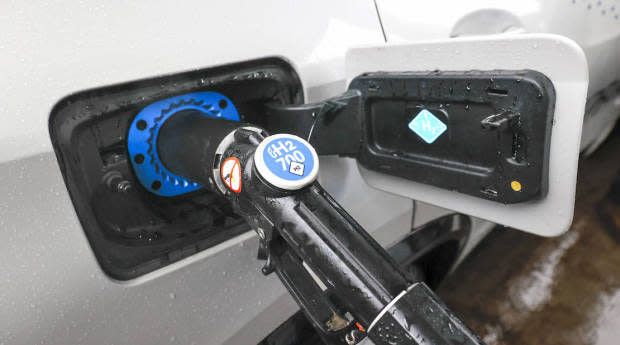This Tiny Hydrogen-Fueled Electric Car Just Broke a Guinness World Record

While traditional electric vehicles are starting to gain considerable market share across the world, other forms of EVs are also becoming more common as companies and researchers look for ways to increase their driving range. One example are hydrogen fuel cell EVs, which produce electricity internally with hydrogen as the source. German auto giant BMW, for example, sent its hydrogen-powered iX5 cars on the road earlier this year, opening the door for others to swoop in and help expand the market.
A team of students at the Delft University of Technology in the Netherlands just made a big leap for the future of hydrogen cars. They even set a new Guinness World Record in the process. The students drove their Eco-Runner XIII vehicle around Germany's Immendigen track for approximately 1,546 miles—roughly the distance between Boston and Miami—over the course of three days on just one kilogram of hydrogen fuel. In doing so, they set a new world record for the longest distance driven on a single tank of the emission-friendly gas. By comparison, the acclaimed all-electric Lucid Air can last between 400 and 500 miles on a single charge.
The Eco-Runner dates back to 2005 and has been continually improved by students in the nearly two decades since. Scientists touted the XIII model, revealed in May, as possibly the most efficient hydrogen car yet. But don't expect to take it out on the highway any time soon. While it may have an impressive range, the 158-pound one-person car can only reach speeds of about 27 miles per hour.
Hydrogen cars represent a growing segment of the auto market as more drivers look to ditch fossil fuels. Over 56,000 hydrogen cars were sold worldwide in 2022, with the market for them expected to reach $17.88 billion by 2029.
Still, the team in Delft views hydrogen-powered cars as a complement to traditional electric vehicles, not a competitor.
"Electric cars are also part of the solution for sustainable mobility, but the electricity grid is already filling up,” Eline Schwietert, the group's press contact, said in a statement. “Electrifying the whole world is not an option. Hydrogen and electric cars go hand in hand. There is not one big winner."
With Tesla's Superchargers becoming the new fueling standard for EVs around the world, it seems like the future of alternative fuels will be built on cooperation instead of conflict.
